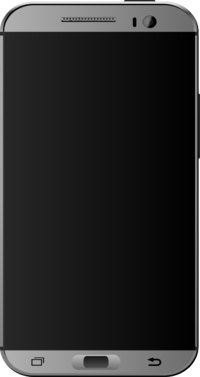Difference between revisions of "Smartphone"
(links) |
(|description=A tool of mass surveillance) |
||
| Line 7: | Line 7: | ||
|wikipedia_protection=1 | |wikipedia_protection=1 | ||
|interests= | |interests= | ||
| + | |description=A tool of [[mass surveillance]] | ||
}} | }} | ||
A '''smartphone''' is a mobile device that combines cellular phone and mobile computing functions into one unit. They are distinguished from "feature phones" (ie [[Nokia]] 3210, 3310, [[Motorola]] C139, etc.) by their stronger hardware capabilities and extensive mobile [[operating systems]], which facilitate wider [[software]], [[internet]] and multimedia functionality. | A '''smartphone''' is a mobile device that combines cellular phone and mobile computing functions into one unit. They are distinguished from "feature phones" (ie [[Nokia]] 3210, 3310, [[Motorola]] C139, etc.) by their stronger hardware capabilities and extensive mobile [[operating systems]], which facilitate wider [[software]], [[internet]] and multimedia functionality. | ||
Revision as of 22:22, 21 May 2021
(computer, telephone, communication technology) | |
|---|---|
 | |
| A tool of mass surveillance |
A smartphone is a mobile device that combines cellular phone and mobile computing functions into one unit. They are distinguished from "feature phones" (ie Nokia 3210, 3310, Motorola C139, etc.) by their stronger hardware capabilities and extensive mobile operating systems, which facilitate wider software, internet and multimedia functionality.
Contents
Hardware
Smartphones, beside audio and video collection, contain a number of additional sensors that can be leveraged by their software (such as a magnetometer, proximity sensors, barometer, gyroscope, accelerometer, or GPS)
History
Early smartphones were marketed primarily towards the enterprise market, attempting to bridge the functionality of standalone personal digital assistant (PDA) devices with support for cellular telephony. The world's first smartphone was created by IBM in 1994, nicknamed "Simon". Shortcomings of the technology and connectivity did prevent proliferation of the technology at the time.
In the 2000s, several developed smartphone like the BlackBerry began to have traction. Following the rising popularity of the iPhone in the late 2000s, the absolute majority of smartphones now have copied the formfactor and usability from it. In the third quarter of 2012, one billion smartphones were in use worldwide.[1]
Backdoors/Malware
Smartphones remain very vulnerable to hacking attacks.[2][3][4][5] In addition, since at least 2014 reports surfaced about devices that were delivered with pre-installed malware in the firmware, a so called hardware backdoor.[6][7]
Increasing Internet use via Smartphone
Smartphones are about to replace Desktops (PC/Monitor) as the main way to use the Internet,[8][9][10] while the usage of social media already happens mostly on smartphones.[11][12] This has implications for how content from webpages must be presented to the viewer. The smaller screen does not allow for more complex information and graphical data at once (it has to be optimized for viewing on a smartphone), which likely leads to fewer views of webpages that do not offer another version optimized for mobile viewing and/or that present more text to read in general.
Related Quotations
| Page | Quote | Author | Date |
|---|---|---|---|
| Backdoor | “Every year, we learn about some issue in WhatsApp that puts everything on their users' devices at risk. Which means it's almost certain that a new security flaw already exists there. Such issues are hardly incidental – they are planted backdoors. If one backdoor is discovered and has to be removed, another one is added” | Pavel Durov | 5 October 2022 |
| Mass surveillance | “Always keen to get the latest smartphone? Soon it won’t matter, said Mike Bechtel, Chief Futurist at Deloitte. “Over the next 10 years its going to be about moving beyond the device,” he said. “We can’t realistically have 15 smart speakers everywhere we go....We are going to be moving to ambient experiences, which is shorthand for a sort of digital Downton Abbey where we don’t ask Echo or Google ‘What’s the weather?’, we just say ‘What’s the weather?’ and the right agent jumps up at the right time to give the right answer.” | Mike Bechtel | 16 April 2021 |
| Mobile phone | “A mobile phone is a tracking device that also makes calls” | Julian Assange |
References
- ↑ http://news.cnet.com/8301-1035_3-57534132-94/worldwide-smartphone-user-base-hits-1-billion/
- ↑ https://medium.com/auedbaki/how-hackers-hack-phone-using-sms-89a5de67e776
- ↑ https://www.wandera.com/is-my-phone-really-more-secure-than-my-computer/
- ↑ https://www.mobileiron.com/en/company/press-room/press-releases/mobileiron-research-reveals-qr-codes-pose-significant-security-risks-to-enterprises-and-end-users
- ↑ https://www.cnet.com/news/your-smartphones-are-getting-more-valuable-for-hackers/
- ↑ https://securelist.com/caution-malware-pre-installed/59356/ saved at Archive.org saved at Archive.is
- ↑ https://public.gdatasoftware.com/Presse/Publikationen/Malware_Reports/G_DATA_MobileMWR_Q2_2015_EN.pdf saved at Archive.org
- ↑ https://www.govtech.com/blogs/lohrmann-on-cybersecurity/will-a-smartphone-replace-your-pc.html
- ↑ https://www.wired.com/2015/02/smartphone-only-computer/
- ↑ https://www.extremetech.com/computing/134868-there-can-only-be-one-smartphones-are-the-pcs-of-the-future
- ↑ https://www.broadbandsearch.net/blog/mobile-desktop-internet-usage-statistics
- ↑ https://techjury.net/blog/mobile-vs-desktop-usage/
